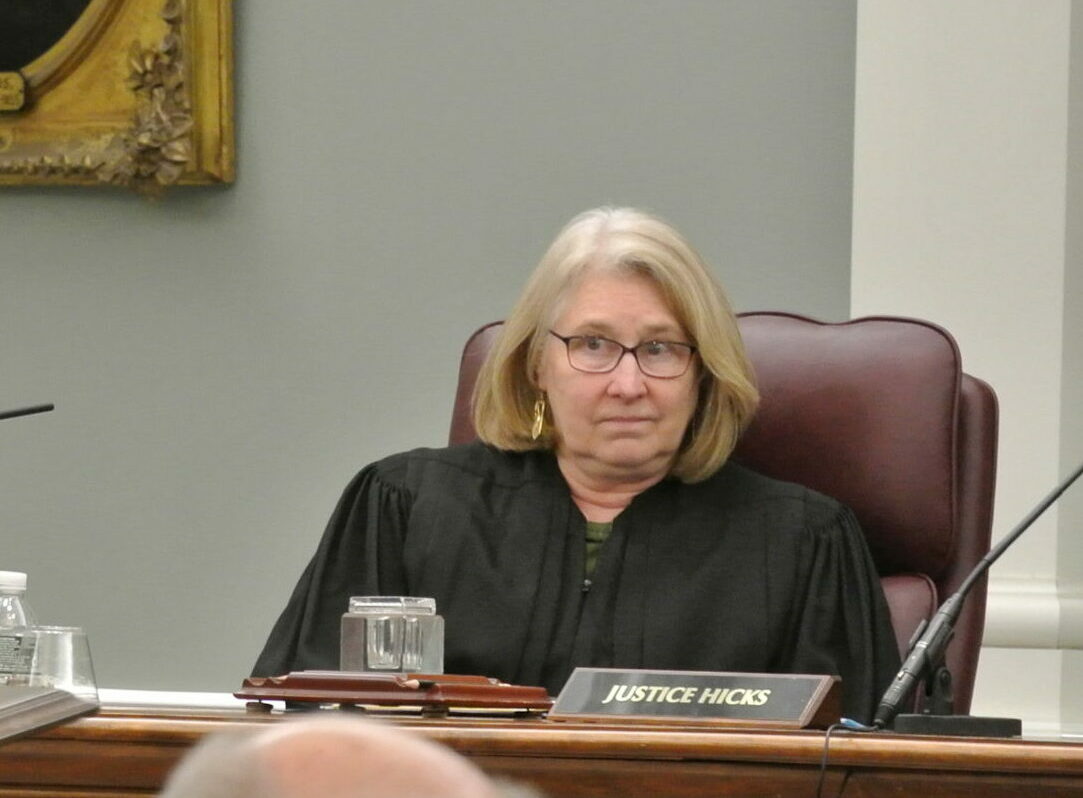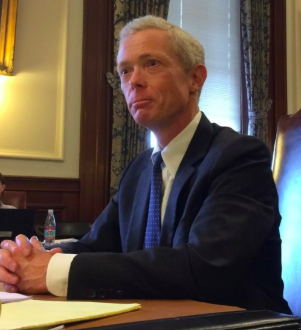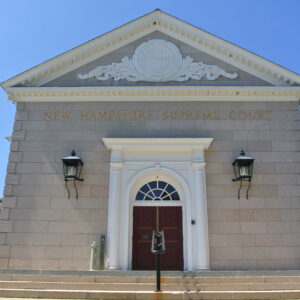The four remaining New Hampshire Supreme Court justices won’t hear any arguments related to Associate Supreme Court Justice Anna Barbara Hantz Marconi after they ordered themselves off the case.
“Resolving it would require us to adjudicate the conduct of a current colleague, Anna Barbara Hantz Marconi,” the justices wrote in the order.
The order comes Wednesday hours after Hantz Marconi’s legal team filed a motion to boot Chief Justice Gordon MacDonald from the case, naming him as a material witness in her alleged crime. Hantz Marconi is charged with trying to pressure Gov. Chris Sununu to stop the criminal probe into her husband, New Hampshire Ports Director Geno Marconi.

Justice Barbara Hantz Marconi listens to oral arguments during a 2023 hearing.
According to the indictments handed down last week, Hantz Marconi met with Sununu in June and tried to get him to stop the investigation into Geno Marconi. She allegedly told Sununu there was no merit to any of the allegations against her husband and the case “needed to wrap up quickly because she was recused from important cases pending or imminently pending before the New Hampshire Supreme Court,” the indictments state.
But, according to the motion filed Wednesday, MacDonald encouraged her to talk to Sununu about her husband’s investigation, and told her it would not be illegal for her to do so.
“Justice Hantz Marconi did meet with Governor Sununu on June 6, 2024. The meeting was entirely lawful and proper. One of the key facts demonstrating that the meeting was lawful and proper is that Justice Hantz Marconi communicated with Chief Justice MacDonald prior to meeting with Governor Sununu. Justice Hantz Marconi explained to Chief Justice MacDonald that she was considering requesting a meeting with the Governor. The Chief Justice’s response was, ‘I think you can do that – You are a constituent and have concerns.’ Justice Hantz Marconi understood this comment to confirm her view that she had the right to seek to address the Governor, just as any other citizen would have that right,” her motion states.

Supreme Court Chief Justice Gordon MacDonald
Hantz Marconi was placed on administrative leave soon after that June 6 meeting. Geno Marconi has been on leave from his job directing the ports since April of this year. Both were indicted last week.
Hantz Marconi is facing charges of Attempt to Commit Improper Influence, Criminal Solicitation of Improper Influence, Official Oppression, Criminal Solicitation of Official Oppression, Obstructing Government Administration, and Criminal Solicitation of Misuse of Position. Geno Marconi is indicted on felony charges of Tampering with Witnesses and Informants and Falsifying Physical Evidence. He’s also charged with four class A misdemeanors–two counts of Driver Privacy Act Violations and two counts of Obstructing Government Administration.
Geno Marconi is accused of giving confidential driving records of an unnamed person to Brad Cook, chairman of the Division of Ports and Harbors Advisory Council and a longtime fishing boat captain. Cook is charged with one count class B felony Perjury as well as two counts of class A misdemeanor False Swearing.
In the meantime, Hantz Marconi agreed to a suspension of her law license as the case against her is proceeding. The New Hampshire Attorney Discipline Office planned to open up a formal proceeding to get Hantz Marconi suspended, but the justice agreed to the suspension.
If she were to fight the Attorney Discipline process, Hantz Marconi’s law license case would eventually end up before the Supreme Court and MacDonald. The Supreme Court’s total recusal effects that process, as well any challenges she brings during her criminal trial in Merrimack Superior Court.
Rather than merely having MacDonald remove himself from the case, Associate Justices James Bassett, Patrick Donovan, and Melissa Countway are also stepping aside. If a full slate of alternates cannot be found, however, at least some of the justices will take their seats.
“Our recusal is conditioned upon the availability of substitute justices to participate in this case. In the event that substitute justices are not available, the ‘rule of necessity’ may compel our participation,” the order states.
Under state law, the courts will randomly pick substitutes from a pool of retired Supreme Court and Superior Court justices. If there are not enough retired justices available, a random selection will be made from active Superior Court Justices, and then District Court justices if the need arises.




